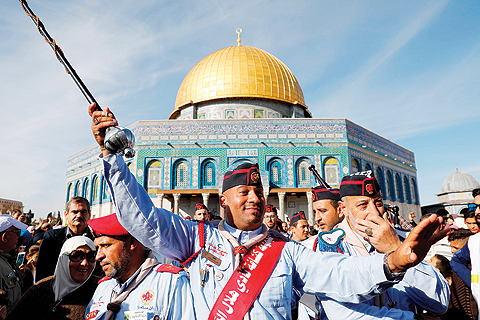 JERUSALEM: Palestinian scouts play music during a ceremony commemorating the birth of Prophet Muhammad (PBUH) outside the Dome of the Rock in the Al-Aqsa Mosque compound yesterday. - AFP
JERUSALEM: Palestinian scouts play music during a ceremony commemorating the birth of Prophet Muhammad (PBUH) outside the Dome of the Rock in the Al-Aqsa Mosque compound yesterday. - AFPAKRA, Iraq: From Sufis in Iraqi Kurdistan shaking their hair to rhythmic drumbeats, to Libyan children receiving toys and Egyptians swapping sweets - Muslims across the world celebrated Prophet Muhammad (PBUH)'s birthday yesterday. Nearly 1,450 years after Muhammad (PBUH) was born at Makkah in modern-day Saudi Arabia, Sunni Muslims marked the anniversary with ancestral customs and new traditions yesterday, a few days ahead of the date recognized by Shiites.
In the Libyan city of Benghazi, the celebration has been underway since late Monday with children unpacking new clothes and plastic toys under strings of colorful lights. The buildings around them are marked with bullet holes and craters - scars of the violent years since the 2011 ouster of dictator Muammar Gaddafi - but holiday cheer seems to overcome that.
In Egypt, candy shops prepare the traditional "mawlid (birth) bride," a figurine made of sugary paste that is then dressed in paper skirts, sparkles, and fabric flowers. According to tradition, the dolls must be offered by young men to their betrothed along with other traditional sweets made of dried fruit, nuts and nougat.
And in Iraq's northern town of Akra, a Sufi ritual takes precedence. Men dressed in loose pants, matching jackets and wrap-around belts stand in lines and semi-circles for the "dhikr", or religious invocations. To the steady beat of a nearby drum and the intonation of the prayers, they whip their long, wavy hair back and forth. Yesterday was a holiday in Iraq, but most of the country - which is majority Shiite - will not celebrate the prophet's birth until Sunday.
Hardline Sunni Muslims do not observe "mawlid" at all, considering it a more modern addition to Islam. When the Islamic State group seized the Iraqi city of Mosul in 2014, it banned celebrating the prophet's birth. Mosul was recaptured from IS in the summer of 2017, and this year, its still-ravaged Old City is alive with people marking "mawlid". Platters of date cookies are passed around the modest homes and traditional prayers are sung across the city. Several thousand kilometres away in Pakistan, mosques are elaborately illuminated with strings of light to celebrate, while in Morocco, the day typically sees the king grant widespread amnesties. - AFP









